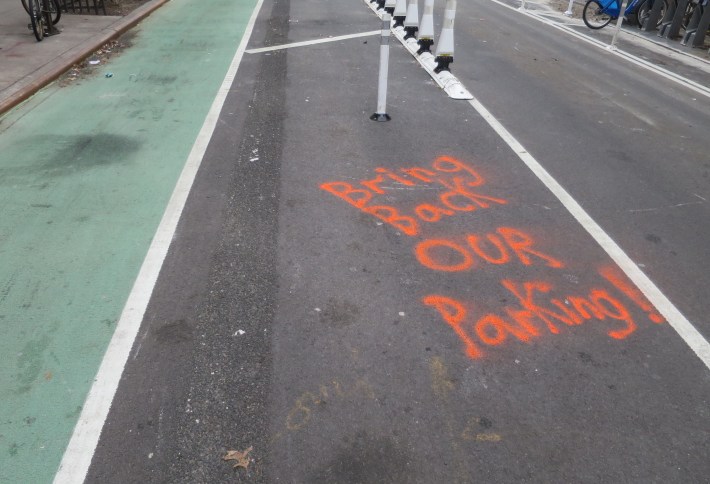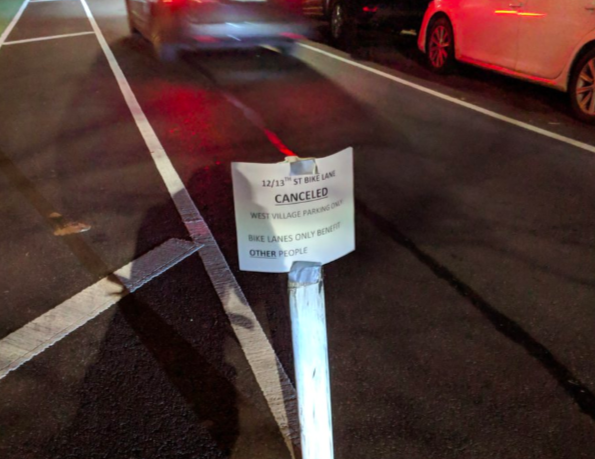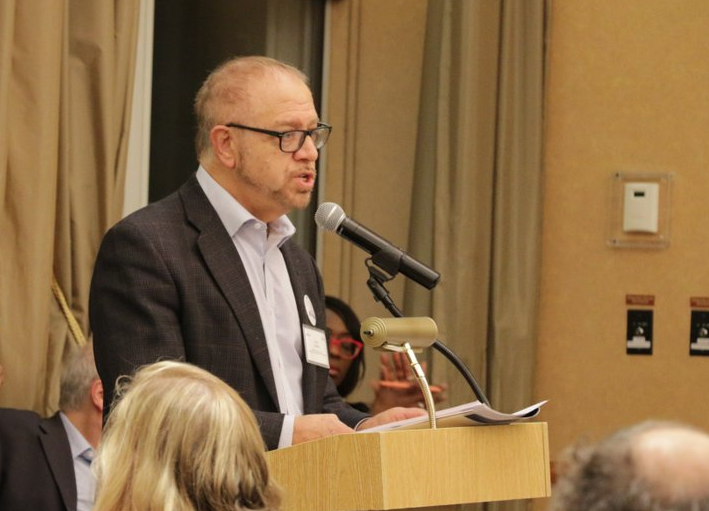Arthur Schwartz will not like reading these words, but he is a NIMBY lawyer.
As the attorney for a coalition of block associations that is fighting the bike lanes on 12th and 13th streets, as well as the city's plan to turn 14th Street into a dedicated "busway," he has been called much worse by supporters of street safety and transit improvements. But by the neutral definition of a NIMBY — a neighborhood resident who hears about a city proposal and says, "Not in my back yard!" — Schwartz is definitely a lawyer for NIMBYs.
But he would prefer it if you'd call him the heir to Jane Jacobs.
I spent 45 minutes on the phone with Schwartz on Friday afternoon after vandals attacked the bike lanes that his group wants removed. He condemned the violence, but then spent the next 44 minutes arguing that the pro-transit community has him and his clients all wrong: They are merely fighting for the "community" to have a say over changes to the neighborhood.
And they believe, he says, that closing 14th Street to cars will send those cars onto local side-streets. He might be right — but then only mentioned congestion pricing as a tangential issue. He also made it clear that he opposes select bus service on 14th Street. So, no, he's no Jane Jacobs in that respect.
He also was very eager to defend his credentials as a "progressive" after many opponents pointed out that it was, how you say, odd, that Schwartz, the political director for the New York Progressive Action Network, was fighting transit and other green transportation efforts on behalf of rich Greenwich Village residents and their supposed right to free on-street car storage. (Schwartz, of course, said parking is not his issue — he spends $600 a month to garage his car).
"Before you attack me as a lawyer for NIMBYs, ... check out what I have done for the last 40 years," he told me in a pre-emptive email after our chat. "I have been the elected Democratic District Leader for the Village since 1995, re-elected 11 times, got elected as an Obama-pledged DNC delegate in 2008, a Bernie delegate in 2016, represented Bernie in 2016, Cynthia Nixon in 2018, Jumaane Williams in 2019, and have built a public interest legal foundation in my spare time (I need paying clients, mostly unions, to pay my bills)."
I pointed out that it’s not an attack to call Schwartz the lawyer for a “not in my backyard” group. "Your group is literally opposing something because of the impact it would have ... in your backyard," I said. "An 'attack' would be to say you are corrupt or doing something immoral, which we have not said."
He claims instead that he and his group are merely fighting for "genuine community involvement in planning," but in our chat, he said he knows nothing about other neighborhoods or their residents, and does not acknowledge that cyclists and transit riders should also get "genuine community involvement." He ignored many of the basics that truly define progressive politics: concern for the common man, the ability to look beyond one's own self-interest to the greater good, or even the desire to bike a mile in someone else's delivery poncho.
The best part of our chat was his conclusion that the mayor would listen to the “very powerful Transportation Alternatives" and retain the L-train streetscape changes as a favor to the all-powerful bike lobby — a conclusion that is very unlikely, given the mayor's fealty to the automobile.
Streetsblog: First of all, what did you think of the vandalism?
Arthur Schwartz: I condemn it. If somebody put glass in the street then it's horrible. I don't believe in vigilante action.
Streetsblog: But members of the 14th Street community put up signs suggesting that bike lanes don't belong on "their" streets.

Arthur Schwartz: My perspective is this: I support bike lanes. When I was a community board member — which I was for 24 years — I would take pride in being the foremost proponent of the bike lane on route 9A [the West Side Greenway]. It was the first and it is still the best as far as I'm concerned. It has the most usage and it's the safest, until some terrorist comes driving down with a car. And I supported the north-south bike lane on Hudson Street in the early 2000s. I was a big supporter of bike lanes. I am not against bike lanes. I want to be clear: I am not anti-bike lane. I have a Yuba chained in my house that is well-used, and I have two Citi Bike keys. ... When my kids were younger, they used to ride on the back to school. [He described a specially made bike that he custom-designed for his kids.] People used to take pictures of my kids on the back reading books or eating sandwiches. So, I'm a big supporter of bikes.
Streetsblog: OK, you're a lawyer so let's stipulate two things: You're a better father than I am and you're a supporter of getting around by bike. Fine. But if you're such a supporter, what bothers you about bike lanes on 12th and 13th streets and a busway on 14th Street?
Arthur Schwartz: I happen to believe that communities that are affected by any change should have a meaningful impact into decisions about that change. ... Affected communities should have a real say, not just bullshit, but a real say on changes in their community. I served on CB2 for 24 years. ... I was the major insister that park planning ... genuinely involve input of and responsiveness to the community. I have four kids. That department and the Hudson River Park Trust responded to the community and changed a lot of stuff. They'd come to us with a plan ... and we would organize community input and they'd modify and they would try to make people happy. Even if people would come from other communities to use a park, to me, people who live there should have the most say. Just because someone says it's a great idea...Robert Moses said that. Robert Moses wanted to build an expressway right down Fifth Avenue and the community said, "This is our community." Jane Jacobs said local people should be involved in planning. She beat them. So you say, "This is not your street. Fifth Avenue belongs to everybody." Yes and no. People that live in the affected community ... have to me should have a major recognized input to what goes on. ... [But DOT] all they did was announce it. They said, "This is what we're going to do." They took questions. There was no input.
Streetsblog: There was plenty of input from other members of the community that you are not mentioning: the non-car owners, the bus commuters, the cyclists...

Arthur Schwartz: This doesn't have to all do with cars. Most of the cars that drive down my block are not from my block. There are other people driving across town. It's not the car issue. I put my car in a garage. It's not the car issue. It's the traffic issue. Traffic causes air pollution, noise, vibration, makes it unsafe for your kids to cross the street. That's my concern, not where I park my car. It really isn't. Is it annoying? Yeah. But I never expect parking is easy. My kids go to Chelsea Piers until 9 p.m. It's either a cab or the car.
Streetsblog: So what is the traffic issue, as you see it?
Arthur Schwartz: You close 14th Street and all those cars are going to go down side streets. Trucks vans cars are going to go across my street, which already has enough traffic. ... That's the traffic. So most of the people involved in the 14th St. Coalition, and it's every single block association in Chelsea and the Village, they're not car owners. ... It's the traffic they're concerned about. ... People thought, planning wise, the people at DOT who I think have not done a very good job of moving traffic in the city ... bus traffic in Manhattan in 2017 moved at 4.2 mph. The average person walks at 3.3 mph. That's slow for buses.
Streetsblog: Sounds like you are making an argument in favor of turning 14th Street into a busway so buses could move faster.
Arthur Schwartz: I challenge that whole analysis, which was all based on guesstimates. Those of us who live over here don't think the busway is going to make it move any faster and it will throw traffic onto our streets. And, this is the second part: the way that the DOT has set up the bike lane, the buffer area is totally being used for parking. I could send you photos.
Streetsblog: I could send you photos! But the traffic you're worried about is even more likely to happen if there's no bike lane because now trucks that illegally park only obstruct the bike lane instead of the car lane.
Arthur Schwartz: Right, and without the added traffic, it's not a big deal [to the drivers]. But the minute you shut down 14th Street, it's a big deal. To me, it's not the bike lane.
Streetsblog: You say there was no community input, but the DOT wanted to put a two-way bike lane on 13th Street, but the community said no.
Arthur Schwartz: (Sigh) They did little tweaks. And people can do drop-offs of 14th Street. If they did a two-way on 13th St, they would have had to shut it to cars. There wouldn't have been room for cars.
Streetsblog: Sounds like a good start! OK, so what do you actually oppose now?
Arthur Schwartz: For me, personally? I am not against the bike lanes. I am against the configuration. There are better ways to a) protect the bike riders b) avoid the trucks and c) allow for traffic flow. I think there are better designs that are better that would make it better. I don't think it's a safe bike lane. Just because you have a striped area? People zoom around and there are angry drivers who pull into the bike lane.
Streetsblog: Those angry drivers are the ones who frighten all of us, including cyclists and, I'd imagine, those elderly people you mentioned to Gothamist, though you said they were more afraid of the cyclists. So now I'm confused again: Who's more dangerous to the elderly: speeding drivers or cyclists?
Arthur Schwartz: I don't think that's a safe bike lane. My position is in the letter I sent to the lawyers of DOT. Genuine negotiation with the community.
Streetsblog: Sure, but in this heightened climate, where people are dropping glass in bike lanes, or saying, "Give us back our parking," this is playing out as a bunch of rich Village residents trying to hold onto their parking at the expense of safe cycling and faster transit.
Arthur Schwartz: No one is saying about parking. [Fact check: Schwartz's letter to the DOT, embedded below, does bemoan the loss of parking.] Well, parking is an issue for people who have cars that live there. [Loss of parking] is supposed to be in all SEQR assessments, it has to be in there.
Streetsblog: You do know that the existence of parking encourages people to own cars and then drive, thereby causing the very congestion you detest.
Arthur Schwartz: I don't agree with that.
Streetsblog: You don't agree that free curbside parking encourages people to drive? It's not a debatable point. There are countless studies on this. Sir, please...
Arthur Schwartz: (long pause) To me the major problem with traffic in New York City is Uber and Lyft, and not local residents. It's also out-of-city residents driving in. That's why I support congestion pricing. If I could get rid of Uber, I would get rid of Uber. If you had fewer vehicles entering Manhattan below 96th Street and fewer for-hire vehicles, we would not have the same problem. People who park on 12th Street never use their cars to go anywhere. ... I have lived in the Village for 41 years, so I don't know what it's like anywhere else. Their statement doesn't say a word about parking. It has four points. It doesn't say a word about parking.
Streetsblog: The sign literally said, "West Village Parking Only."
Arthur Schwartz: So people put up signs. But the most you could conclude is that one sign is the view of one person.
Streetsblog: You certainly know that the issue of parking comes up all the time at these meetings. Many people who own cars believe that their ability to park freely is more important than a clear right of way for transit users or cyclists.
Arthur Schwartz: Some people say that. I have not advocated that position and I don't like being labeled that way on your blog. Frankly, my business partner bikes to work from Brooklyn every day and is a big fan of yours. I don't hang out with car-parking advocates.
Streetsblog: You do represent some of them.
Arthur Schwartz: I represent a coalition of block associations. And they really want to be negotiated with. That's the main thing they want. Traffic on the side streets is the key issue. [Point of fact: Block associations tend to be dominated by landowners, and do not always reflect the full diversity of a neighborhood.]
Streetsblog: All of this could be moot because the mayor might agree with you that all the L-train mitigations no longer are needed because the L train won't be shut down.
Arthur Schwartz: I don't think he's going to do that. You guys wield a lot of political power.
Streetsblog: Streetsblog?
Arthur Schwartz: Maybe not Streetsblog, but TransAlt. The mayor is a big fan, even though he drives everywhere.
Streetsblog: You really think he's going to bend to bicyclists? Care to make it interesting? Are you a betting man?
Arthur Schwartz: No, I'm not a betting man.
Letter from Arthur Z. Schwa... by on Scribd






